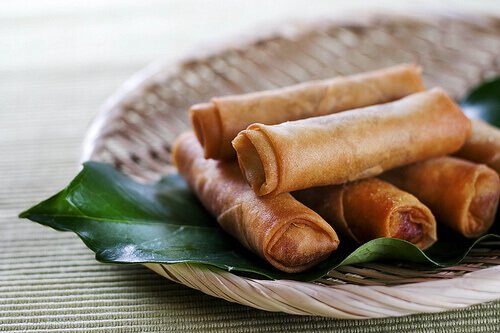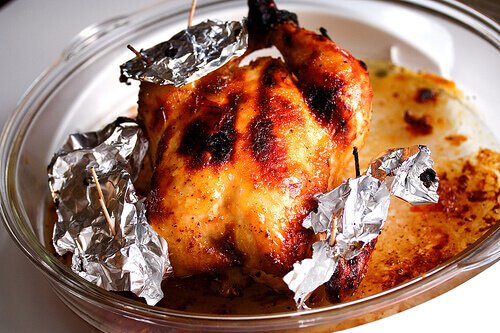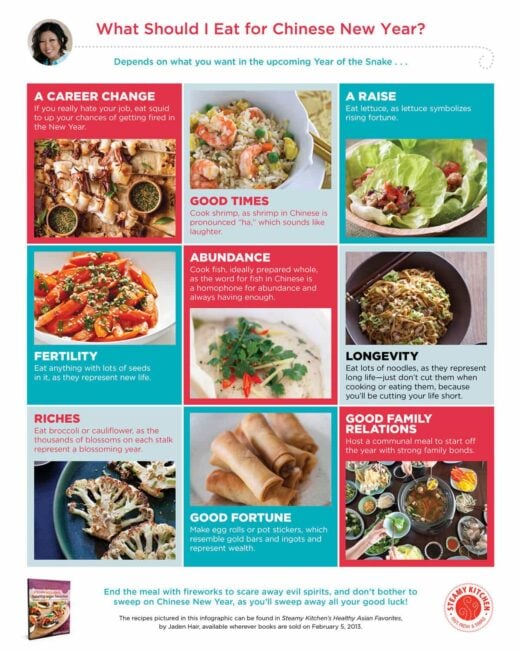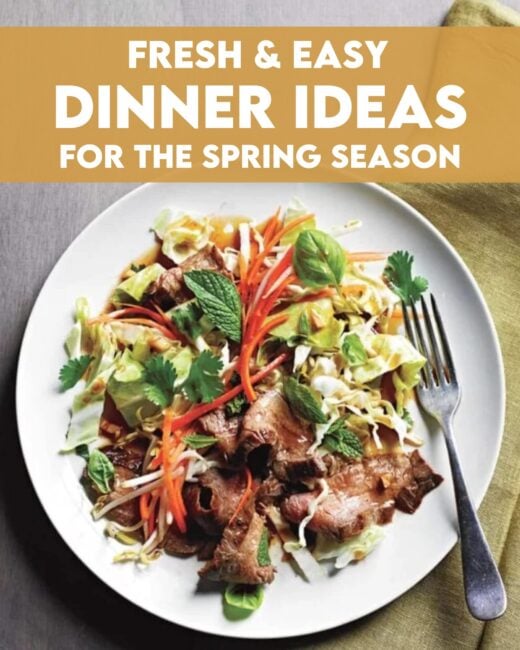February 7th marks the beginning of the rodent’s 12- month reign as the Year of the Rat. The more popular Chinese New Year traditions, like the dragon dance, red lanterns and firecrackers, are easy to talk about, but I wanted to interview my parents for their take on the little known food traditions of the holiday. Each province in China celebrates different customs for the new year, and I’ve discovered that the southern Cantonese are mighty superstitious folks. My mom began rattling off dishes that her family prepares and serves to guests.
My mom:
• To begin with, Mom always serves a noodle dish, the strands of the noodles signifies long life. Don’t cut the noodles before serving, otherwise you’re snipping your life short.
• A whole chicken, head and all, is served simply steamed to represent good health. A whole steamed fish, eyeballs and all, was served for abundance.” The Chinese word for fish is, “yu,” which, according to my mom, sounds similar to the Chinese word for “every year our family has something leftover and we always have enough.” The Chinese are very efficient in the language department.
• Crispy egg rolls, once fried to a golden brown, resemble long gold bars. Handmade dumplings, either pan fried or boiled, look like ancient Chinese gold ingots. My mom’s family used to hide a gold coin in one of the hundreds of dumplings that they would make and the lucky bastard who bit into the dumpling with the coin was to receive wealth and prosperity throughout the year following a hefty dental bill, I’m sure.
• For luck, display plenty of tangerines, preferably big fat ones with leaves still attached. Also of great importance is “Nien Goh,” or steamed rice cake, which signifies “every year you reach a higher level of life,” says mom.
• But whatever you do, don’t serve squid, called “Yow Yu.” In the olden days, workers would have to travel far from home to work, often bringing personal belongings rolled up in a blanket. When a worker was fired, he was ordered to “yow,” or roll up his blanket, packing his stuff to go home. Serving squid symbolizes being fired in the coming year. If your co-workers or subordinates pleasantly surprises you with a dish of succulent squid on February 7th, be very suspicious.
My father, from the Ling Po province of China, near Shanghai, is a simple man. Here’s what he had to say…
My father:
“In our kitchen, we would hang a portrait of the Kitchen God. The Kitchen God watches over you all year and on Chinese New Year, he goes back to the heavens and reports to the other Gods of prosperity, fortune, and health, on what you’ve been doing and how well you’ve behaved. Before the end of the year, my family would create an elaborate banquet just for the Kitchen God and display the plates of noodles, dumplings, fish, candies, cakes and meats right in front of his portrait. Basically, we bribed the Kitchen God to say nice things about us.”
So, there you have it. Whether you choose serve your friends and family a wonderful Chinese meal to welcome the Year of the Rat, or cook to bribe the Kitchen God, here are a few recipes that would be great for the holiday. Also take a look over to the next column to the right – there are more recipes for you!
What are some of your Chinese New Year superstitions?
***

Mother’s Famous Crispy Egg Rolls or her Vegetable Spring Rolls with video (egg rolls look like gold bars, which symbolize wealth)
***

Roast Chicken with Sweet Plum Sauce
***

***

***







I was thinking if I could use this information in my homepage. I will provide a link to your site, may I?
I am searching for your “Loh-hey” Chinese New Year salad and dressing. I thought I saw it at one time and lost it. Would you please tell me where to look for it.
Thanks,
Wendy
Hi Jaden, Hope you don’t mind that I revisited this link to include in a post I did today. Thanks for sharing…I have it in my resource section:) I found your link through my personal search engine where you’ve been since my first visit here. Everything looks so good and I adore the added commentary!!! Happy New Year!!!
Sweets…you forgot that sweets are a must to ensure a good year ahead. Cookies, candies, chocolates are always on everyone’s snack bar during Chinese New Year.
Pineapples are a must as well because of the meaning of the Cantonese/Hokkien word – “wong lai” or “ong lai” (fortune comes). Besides, pineapples signify gold so in Hokkien and Malaysian-Cantonese homes, anything with pineapples – deco, cookies and the fruit itself – can be found. 🙂
hm, hey there evryone whats up?
me nothin just chillin
Well i have to say i love the food of chinese new year(:
YAY!
A little late here, but there are 15 days to the Chinese New Year celebration. 🙂
This year I made my first attempt at Fatt Goh. These steamed muffins are an indicator of your fortunes in the coming year. They are not supposed to collapse or remain flat. They must rise so much that the top splits open like a blossom, since to rise or “Fatt” is the same word as in Fatt Choy, to become wealthy. It was a nerve-wrecking 20 minute wait, but mine blossomed. phew.
Happy Lunar New Year!
I do not know much about new year food superstitions but still, Gong Xi Fa Cai!
Nice blog. Vietnamese rock!
Hey Gandamora – I don’t know how to change your option. Can you email me the 11 feb 2008 email?
email me at : jaden@steamykitchen.com
Dear team management,
this mail (info) below has nothing to do with the CNY.
—————-
I had make a wrong choice namely at yr mail dt 11 feb 2008 the questions was;”to manage subcpritions or to block all notifications from the site click the lijk below”right. I had make the wrong choice and will still manage this site. Do somebody can help me to make it in order? I am, grateful thank you very much, indeed.
Your mom is absolutely correct about squid. I was ‘inventing’ in my kitchen yesterday (a bit late, but in honor of lunar new year, at least in my mind) by stuffing squid tubes with an asian-inspired concoction of crabmeat & spices. I cut my finger pretty badly, burned another finger, and made a HUGE mess in the kitchen when the fryer foamed-over. If only I’d made my dumplings instead.
well i am, we are not chinese but we are most interested in chinese food,
especially i am also interested in chinese culture and the most astrology are chinese which are the most rightly.
enyoing(celebrate) every chinese new year in the chinese-town of Amsterdam There are every chinese new yaer full of much differents chinese food and i thing (at least for me ) the Guangdong kitchen is very delicious I am right? Also people can walk around to see all exhibition of chinese trade and chinese food and watching to fir work. And at home we oftenly eat chinese food more of the indonesian chinese as we are from Indonesia but we l.ioke more the originale chinese food from the Guangdong region. My wife love to makes crispy egg rolls, so we have very often crispy eggs rolls on the table.
thank you. Gandamora Pascal D. Siregar
Oh, jeez… Chinese New Year is like Christmas for my mum and my dad (they’re from the Guangdong region). Let’s see… we make nian gou, lo bak gou, wu tou gou, fat choi + ho sin, lai mien, gok zei, yu (head and eyes and all) and we get signs with ‘gong hei fat cho’, ‘fouk’ (hung upside down), and some other stuff I can’t really remember XD… we have oranges in the kitchen, those turning things stuffed full of candy, and my parents take us around to the few friends + relatives we have over here for lei see (the lei see we get from our parents is stuffed under our pillows). On the actual CNY day, we’re not supposed to wash our hair and we say ‘gong hei fat choy, sun tei ghin hong’ and stuff like that. Yeah, we’re definitely pretty superstitious. XDD (my parents are still making nian gou, and a pan of it just fell into the steamer water…)
Being of Irish, Scottish and German descent, I don’t have any Chinese New Year superstitions, but I did enjoy the informative and humorous way you presented those of your parents.
I especially laughed about your crack about the gold coin. Because my dad is a dentist, whenever I read about traditions involving hiding things in food (like hiding a baby in a Mardi Gras King cake), the first thing I think of is people breaking their teeth! I can’t bring myself to adopt any of those traditions.
Gonghei Fattchoy Jaden and a toast to more great pics and recipes on your blog!
for CNY, we were not allowed to say anything “bad”
like after dinner–say “I am full” not “I am finished”
and try not to drop your chop sticks
and always greet everybody with “goon hay fat choy!”
Please ensure that I am invited next year!
Thanks for sharing your “superstitions” jaden!:) at least that gave us some great food!! Wish you a fabulous New Year girl, especially with all the things you have planned ahead for your foodie world!:)
no traditions here! but after seeing all that delicious food, i wish! i was thinking as i read about the kitchen god, “maybe i need one of those!” until i saw about the ‘how well you have behaved’ part…fuggedaboutit! “well-behaved women rarely make history”! ;]
Oh dear, I forgot about all the superstitions! I managed to get my son to clean his room without a fuss on CNY yesterday. Is it okay if the dirt is in the handheld vac which is still in his room? Also, if I had a really crappy year, does that mean it was okay to sweep and wash my hair? I’m going to have to do better next year!
We celebrated with prawns in black bean sauce with red and green peppers, peapods(?) and onions. Thanks for the very entertaining and delightful blog!
@Kim
Gai Mon!
I’d forgotten about the different banh.
Off the subject of food : I work in a nail shop with lots of superstitious women. It’s not only vital to start off the first day of new year eating well & looking good, but also working on a good customer $$$$$. If their first client is a pedicure, “It no good luck to do feet . Future will say we have stinky luck for 2008. “. Geez.
I started off my good luck on this first day with a box of rhamutans. I ate 7 of them (lucky number) and shared them with the ladies at the nail shop and said, ” You do this pedicure and I’ll give you 7 lucky, red rhambutans to fend off any bad, stinky luck that might haunt you”. We all made a deal!
Happy New Year! I wish you and your family all the best in the upcoming year.
It is neat to read all the different superstitions and see the parallels between cultures as well as the opposites.
For Tet (Vietnamese name for the lunar new year) we eat sticky rice in several forms. There is a round steamed sticky cake (banh day) made from glutinous rice flour that we use to make a sandwich of sorts. It represents the heavens. There’s also a square cake made from glutinous rice and is filled with mung bean paste and pork similar to lo mai gai (banh chung). It represents the earth. Both cakes go back to an old story about a Vietnamese prince in a food competition to inherit the crown. Like Iron Chef: ancient style!
Wow, that was very informative. Thank you for sharing that. It all makes sense.
Happy Chinese New Year to you and your family!
Happy Chinese New Year! You would think the egg roll was bad luck and not the squid because it’s rolled like a blanket…but I’m really glad its not. 🙂
Delicious food! Happy Chinese New year. This year is my year RAT:)
Gong Xi Fa Cai to everyone!
The main superstition I remember from when I was a kid was that you’re not supposed to sweep the front stoop on new year’s day. It symbolized sweeping away the good fortune from the house.
Happy Chinese New Year!
Your food pics rock!
Hey babe! May the year of the rat brings you lots of fortune and good health!
GONG XI FAT CAI!
Kong Hei Fatt Choy to you and your family!
Gong Xi Fa Tsai to you and your family, Jaden. Wishing you all every happiness in the new year!
My family’s Filipino as well, and we did the coin tossing – ouch is right. We also keep a bowlful of round fruit (a Chinese tradition) and cook up tikoy (the Filipino name for sticky rice cake – also Chinese – most versions are stamped with a double happiness character).
I used to celebrate the Lunar New Year every year I was at UC Berkeley over at the Oakland Chinatown – loved the parades, and loved the free food I got for volunteering at the Oakland Asian Center!
Yea, my parents are from Quang Duong area too. They grew up in Hong Kong. Many Cantonese superstitious traditions. Cleaning the house, not washing the hair, wear red, tangerines and oranges with little red envelopes stuck between the fruit. Having plenty of iceberg lettuce in the fridge(to grow money), new bag of rice, plenty of salt, and oil Visiting friends and family with bags of oranges, fruit and envelope swapping.
It’s all about the food for me. I love the Hoe See Soong, Jai, clams in black bean sauce (the clams shells were to represent gold coins) crab, fish, lots of yummy food. I enjoy the Jai, and sometimes when we were lucky, mom would make shark’s fin soup for the dinner. All the pastries to eat. Man, I wish I was back in CA during CNY. As it was I held off getting all the fresh, need to eat it today ingredients until today. Guess what? Tornado watch! So I got scared and didn’t want to leave the house. No way I could get all the shopping and cooking done by 8pm for dinner. We ended up going out for dinner. Have I mentioned there are no decent Chinese restaurants near me? The ubiquitous Chin Chin, with the jack of all trades over used brown sauce doesn’t cut it for me. Hell the restaurant we went to tonight, even warned us, we would not like their version of Peking duck and to just get the crispy duck instead. So, I now have the wrath of the CNY gods because I will do my celebratory dinner this weekend instead.
My husband’s family is Filipino, and they throw money (think: loose change) all over the place to celebrate the new year. It, um…hurts. We made the chicken with plum sauce a few weeks ago, and it was super yummy! Happy Chinese New Year!
I always enjoyed CNY when I was little (I’m not Chinese, but our neighbors when I was a kid were), but I wish I’d had a better appreciation for all of the food! Now that I’m grown up and know my way around the kitchen a little better, I think I’ll try out some Chinese recipes tomorrow.
Happy Chinese New Year! I can’t wait to see what you make.
??????????
Gung Hay Fat Choy!
The coin in the dumpling story reminds me — I’m half greek, and when we would celebrate greek easter growing up (or maybe it was for christmas! fuzzy childhood memories), my grandmother would always bake a loaf of bread with this sticky, sweet glaze, and bake a dime into it — whoever got the dime was supposed to have good luck for the following year! funny how different cultures have their variations on the same traditions. 🙂
Oh yes i ‘ve had loads of long life noodles, mostly on my birthday, my Chinese friends have to say the same things… dont cut them 😛
Absolutely love your mums egg rolls. Sometimes i really wish i was born in a chinese family. I love the cuisine and almost everything about them !
Happy Chinese New Year to you …. Kung hei fat choy!
all the photos you take of the food you make, mmm, sure does make it all look scrumptious!
My family would make or purchase sesame seed balls, or “jeen dui” because of their round shape and gold color, symbolizing luck. Sometimes my relatives would make variations of this common dim sum dessert, too. The traditional filling is red bean paste, but I’ve also had some with toasted peanut and coconut filling, or taro paste. All are delicious, nonetheless.
Just found this blog from my Google Reader recommendations out of all things…Good stuff!
I wouldn’t trade stories like that for anything in the world. Well, maybe I’ll hold back on some Monk Jumps Over The Wall, but NOTHING else!
Happy Chinese New Year to you and your family!!
My mom went balls out for CNY. She decorated one of the rooms in her house with all red and gold. I was like dammn mom.. you went crazy.
She’s been making all kinds of goodies for CNY which she posts on her blog. http://daimakitchen.mysinablog.com/ Beware… there’s tons of Engrish on there.
The only real superstitious thing that I remember as a kid was having to eat the hairy seaweed and tofu stew. I still love that stuff *drool*. Oh yeah and banging on pots and pans makes the demons go away too?
Wonderful post! For some reason I remember my first and second grade classes celebrating CNY, even though we were in the middle of Dutch country (Michigan). After my family moved to Albuquerque we didn’t celebrate it anymore. Now I’m in Michigan again for school and finishing up a Chinese language minor- hurrah, all the Chinese department people are setting up a New Year’s dinner! I’m so excited!
I hope “yu” is on the menu, that fish looks so good. When I first started learning Chinese I named my goldfish “Jin Yu”… you guessed it, “goldfish.” *blush*
Sounds like a kitchen God is a lot like a husband. Bribery with good food always works for me.
I am not Chinese, but I loooove Chinese New Year. Sadly, I’ll be away this year during it so last week I made home made roast pork buns. We are just finishing them today 🙂 I made 24 and they were half gone the day I made them between just me and my boyfriend! Whoops!
All these dishes look fantastic!
That’s a very interesting set if superstitions. I’ve heard similar things, but for things like what numbers represent, and it just makes me appreciate all of the extra thought going into the food, culture, etc.
The recipes you posted all look really tempting and sound like reason enough for me to be celebrating the Chinese New Year, at least in the kitchen!
Chinese New Year means I get to eat lots of homemade dumplings from my Chinese friends!
Kathy – the spareribs would be great with red wine and they are very simple to make. they are a classic ‘dim sum’ dish.
Infromative post and the food you serve up for new year sounds so delicious.
I love the crispy rolls from you mom, tell her i am coming over. If i was living close by I would have done it after seeing that pic 🙂
Apparently during this year of the Rat, according to a friend’s fengshui consultant, do not open your back door too frequently or else too much money will ‘flow’ out of your life. (Yes, we’re talking about the back door of your house, Mrs Steamy; what else are youse thinking about?!) ^_^ Happy CNY to you and yours!
So much fun to read about everyone’s new year’s traditions and superstitions in your post and in the comments. Happy new year!
All those dishes have brought back memories of my childhood….
We had this dish which I never liked..dried oysters with this black hairy seaweed(“ho-si fatt-choi”) which meant “good things and prosperity”, loosely translated. Also, we couldn’t have duck at the reunion dinner as it had a “flat bill” which may indicate unhappiness, whatever. These days I think most people have relented and allow roast duck at the table, which is definitely a bonus! Oh yes, nothing black in the house, including clothing. We always had to wear something red the first day of CNY.
This Saturday, we’re just doing a steamboat (hot pot) dinner which is a nice slow relaxing meal and perfect for the winter, and I don’t have to cook, well, maybe just for myself! Happy New Year!!
Apparently we’re not supposed to take the trash out either. my mom says we have to throw away all our trash and old crap before new years. Plus, no sweeping or cleaning in general. the one thing i look forward to besides the red envelopes is the nian gao. it’s fanfrickintabulous, especially homemade versions.
Happy Chinese New Year!
I love this blog. I miss living near San Francisco and seeing the New Year’s Parade. I was there two years ago, and loved the dragons and the firecrackers!
I am having a red wine tasting at my house on Thursday night, any tips on Chinese dishes I can serve as appetizers that would match with a red wine?
Kathleen Lisson
happy CNY to you! i don’t remember much about the superstitions stories, but i know we’re not supposed to sweep on the new year’s day, for it’ll throwing out our luck out the door.
Okay, so I’m not Chinese, but I have fond fond fond memories growning up of participating in Chinese New Year celebrations with my dad’s Vietnamese (I know, totally different parts of the continent) girlfriend. I remember the food, the dancing, the dragons, and the gold coins or dollar bills given to the children. It’s a shame I never really grew up to experience my own heritage, but I feel like those days participating in the Vietnamese community really sparked an intense interest in all things Asian. I haven’t been to a Chinese New Year celebration in years–now that I’m in a more diverse international community, I might should look to see if there’s anything going on this weekend!
thanks for sharing all the Chinese superstitions! Kung Hee Fat Choy!
There’s this CNY tradition we practice in Indonesia (not food related tho):
head to toe new clothings, down to your undies, preferably all in bright red with shiny gold chinese character of the word FORTUNE FORTUNE FORTUNE -> in chinese -> “fook….(me?)” KIDDING!!!
pls pls plsssss forgive me, God of Fortune……i’ll let Jaden bribe u with her CNY dishes as mine will only piss u off more…
Gung Hey Fat Choy, everyone!
thanks for sharing your stories…the only tradition i grew up with is that chinese from this side of the world give out the glutinous rice delicacy to maintain “sticky” or tight relationships among family and friends. it is called “tikoy” and is quite delicious. just slice, dip in either flour or egg, and fry. have you tried it? am looking forward to see the dragon dance and fireworks this year. to you steamy and family, kung hei fat chai!
Gorgeous, gorgeous photos!
My grandmother was big on the no washing hair on New Year too. Traditionally the luck money is given to unmarried young people and children. I’ll be going to my daughters’ school to talk about Chinese New Year. I’ll have to fake the dinner. I’m in a small town in AZ so no good Asian grocery store for the proper dinner. 🙁
BTW – Is money given only to kids for Chinese new years or adults get it too??
Well for our new year, we make a dish with 6 ingredients . Jaggery, tamarind, bitter flowers,chilli powder, salt,green mango for tanginess ( apparently this is different from tamarind’s sourness). This represents the 6 states in life you will feel at one point or other, sadness, happiness, anger and such.
We also believe that whatever you do on new years day you will do for the rest of the year. This is the strangest thing I have heard;).
hmm.. Despite being a Christian, we still follow some of the superstitions or traditions as we call it.
1) No washing of hair on CNY- apparently u will wash out your wealth! yikes!
2) No sweeping or mopping of floor- signals sweeping or mopping our wealth away.
3) Red packets of even amount of $ which I wont receive this year since I wont be back with my family *SOBSOB* – represents good things come in pairs.
3) Visiting our relatives with mandarins-“gold” in cantonese. Man, we Chinese are obsesses with wealth!
4) Loh Hey- a platter of salmon/raw fish + plum sauce + ground peanuts+ all kinds of veges toss up as high as u can as we recite lucky phrases/wishes. This is MY favorite! hehee
Happy CNY to you too!!! Have a GREAT FEAST ON THE EVE! =)
To snack on, I mean! Gahhh! =)
I’m still laughing at your description of the coin in the dumpling & the “lucky bastard” who’d bite into it!
What I remember most about the Chinese New Year is receiving lots of “moon cakes” from our Chinese clients. My (late) grandfather loved these, so I’d bring them home for him to snack home. No loss for me, ’cause I wasn’t too fond of ’em.
My parents used to give us hong bao, but ever since I started college, mine has seemed to decrease in value… they say it’s because I already drain out their bank accounts through tuition!
re: #11
my mom also follows that superstition about cleaning! i, too, was grossed out by the no washing hair rule, haha. i believe you are allowed to shower though =P
You didn’t mention the jai in the morning on New Year’s Day…your first meal after feasting the night before. And supposedly the only food you eat that day.
good lord…i’m drooling over alll the photos. i love your site! 🙂 huge huge fan! have a great and prosperous new year! 🙂 please eat enough for me too. hahaa
Love the stories… love the food pix and recipes …
What time is dinner?
We’ll all be over with offerings.
I’m sure there’s ***NOTHING*** like Chinese New Years at Jaden’s Steamy Kitchen.
Gung Hay Fat Choy !
If I remembered correctly, there is this mushroom, meat (pork i think) and “fat choi” stew dish that my mum always cooks for chinese new year. I can’t remember what it means though.
The only superstition that I know relating to chinese new year is that under NO CIRCUMSTANCES are we allowed to do any sort of cleaning on the first day of chinese new year. Oh and apparently you’re not to wash your hair or something.. (eww!)
Sigh, I’m so going to miss chinese new year food. We’re celebrating sans family this year because we’re overseas 🙁 and since I suck at cooking chinese food, we’re all having steamboat for chinese new year. Hehe.
Happy Chinese New Year Jaden 🙂
I just loved receiving red envelopes of money, but I think now that I am married , I can’t anymore. I love the spare ribs in black bean sauce. In cantonese we call fish, “nguy”, I forgto what we called squid. That’s why my brother calls me a half-baked chinese.
Ooh, I wish those ribs in black bean sauce would jump into my mouth!
Thanks for such an interesting post! Usually I’m ready for Chinese New Year – The store I shop at will have a big desplay of Chinese and Viet Namese (this is France!) foods. Either I missed it or they changed.
I’ll have the prawns, please!
In my own Chinese New Year superstitions I cook to bribe the kitchen dog and a little over a week ago we honored the southeast Michigan muskrat by eating some of them. All I need now is some Frankenmuth/Mackinac Island fudge and I’ll be all set. 😉
Oh my. I’m in heaven with all this delicious food.
Gong Hey Fatt Choi!!
My superstition simply involves a lot of Maotai and some friends.
However, later today, I think I’m going to beg my chums at the local Chinese restaurant to see if they’ll make one or two of their freakin’ unbelievable Peking ducks which I will serve to the few friends lucky enough to show up here.
It is the best duck I’ve ever had, and I wish he’d give me the recipe –but, that’s what the other bottle of Maotai is for. Every year we go through this.
Well I’m Korean-American. Growing up we celebrated the Lunar New Year with dumpling soup, steamed pork and ginger dumplings, sweet rice dumplings with a brown sugar and sesame seed filling…beyond that I don’t remember much. There were lots of dumplings.
I do remember at one point I was helping my mom make the sweet dumplings and her friend looked over at me and said, “Look at all those lovely, symmetrical creases! You’ll have a very pretty daughter one day.” Later that evening my dad was recruited to help out, and this same friend looked at his work and said, “You’re lucky your daughters are already born.”
Ooh, these all make me want to celebrate the Chinese New Year even though I never have before and I’m not Chinese!!
We don’t have elaborate superstitions. There is one that tastes bitter, one salty, one sour, one sweet etc.. to represent the various facets of life. Meaning that we should be prepared for whatever life offers in the coming year.